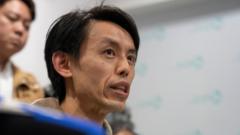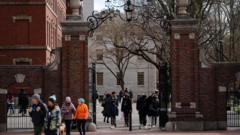In a late-night press conference, party chairman Lo Kin-hei revealed that members will soon vote on whether to officially shut down the party, which has seen diminishing influence due to stringent government regulations imposed by Beijing.
**Hong Kong's Democratic Party Moves Toward Dissolution Amidst Dissent Crackdown**

**Hong Kong's Democratic Party Moves Toward Dissolution Amidst Dissent Crackdown**
The leaders of Hong Kong's prominent Democratic Party announced plans to dissolve the 31-year-old opposition group, signaling a significant setback for political dissent in the city.
The Democratic Party's weakened status reflects broader challenges for opposition groups in Hong Kong, as political pressures mount, leading to significant changes in the political landscape.
In a significant announcement, Hong Kong's Democratic Party, once the largest opposition group in the city, is set to dissolve. Party chairman Lo Kin-hei informed the press that the decision is under consideration, with a vote slated for members soon. The Democratic Party's decline began following a series of government crackdowns on dissent initiated in response to the 2019 protests.
Beijing and the Hong Kong government defended these actions as vital for national security, making it increasingly difficult for opposition voices to survive. Among these measures was the "patriots law," enacted in 2021, which restricted electoral participation strictly to those deemed loyal to the Communist Party, effectively barring the Democratic Party from competitive elections.
At the press conference, Lo discussed the challenges faced in developing democracy in Hong Kong, particularly over the last few years, but refrained from commenting on potential political pressures influencing the party's decision. To affect the dissolution, a minimum of 75% of members attending the upcoming general meeting must approve the shutdown, though a date for this meeting is yet to be announced.
In response to the Democratic Party's struggles, Regina Ip, a Hong Kong government adviser, labeled their agenda as adversarial to China, claiming that their loss of supporters was anticipated given their political stance.
Historically, the Democratic Party engaged in unique dialogue with the Chinese government by negotiating electoral reforms in 2010, which ultimately led to a rift within the party and a decline in popular support. Despite a resurgence following the 2019 local elections amid protests, the turmoil within the party led to several key members being jailed under the national security law or fleeing abroad.
One notable action taken against the party was the revocation of honorary titles from veteran pro-democracy figures, indicating an ongoing crackdown against dissenting voices in the region. With this backdrop, the Democratic Party's potential dissolution highlights the ongoing struggle for democratic representation amidst increasing restrictions in Hong Kong.
In a significant announcement, Hong Kong's Democratic Party, once the largest opposition group in the city, is set to dissolve. Party chairman Lo Kin-hei informed the press that the decision is under consideration, with a vote slated for members soon. The Democratic Party's decline began following a series of government crackdowns on dissent initiated in response to the 2019 protests.
Beijing and the Hong Kong government defended these actions as vital for national security, making it increasingly difficult for opposition voices to survive. Among these measures was the "patriots law," enacted in 2021, which restricted electoral participation strictly to those deemed loyal to the Communist Party, effectively barring the Democratic Party from competitive elections.
At the press conference, Lo discussed the challenges faced in developing democracy in Hong Kong, particularly over the last few years, but refrained from commenting on potential political pressures influencing the party's decision. To affect the dissolution, a minimum of 75% of members attending the upcoming general meeting must approve the shutdown, though a date for this meeting is yet to be announced.
In response to the Democratic Party's struggles, Regina Ip, a Hong Kong government adviser, labeled their agenda as adversarial to China, claiming that their loss of supporters was anticipated given their political stance.
Historically, the Democratic Party engaged in unique dialogue with the Chinese government by negotiating electoral reforms in 2010, which ultimately led to a rift within the party and a decline in popular support. Despite a resurgence following the 2019 local elections amid protests, the turmoil within the party led to several key members being jailed under the national security law or fleeing abroad.
One notable action taken against the party was the revocation of honorary titles from veteran pro-democracy figures, indicating an ongoing crackdown against dissenting voices in the region. With this backdrop, the Democratic Party's potential dissolution highlights the ongoing struggle for democratic representation amidst increasing restrictions in Hong Kong.






















